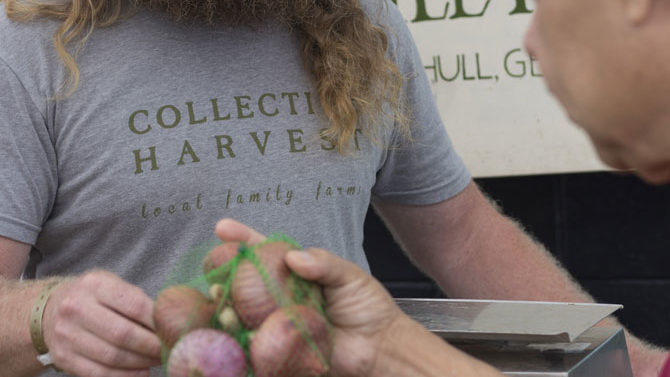As the idyllic nursery rhyme goes, “Old McDonald had a farm,” but what happens after Old McDonald passes on? Who takes over the farm? With the average age of today’s farmer nearing 60 and fewer family members poised to take over, many are wondering, where is Young McDonald?
Most likely, working on a small, sustainable farm. Organic farming has attracted a new generation of farmers in their 20s and 30s who want to reconnect with their food, and Athens farmers reflect that trend.
“I began to realize our food system was taking a turn for the worse, and I wanted to participate in bringing good food to our local community,” says Full Moon Farm’s Eva Farfour. After working with conventionally grown perennial and annual flowers for several years, Farfour wanted to explore sustainable, organic methods of growing. She hasn’t looked back.
“Now, not only am I satisfying my own desires to be outside and work with beautiful plants, but I can share the bounty of this hard work with others that also appreciate it,” she says.
Diamond Hill Farm’s Carter Dodd worked at The Foundry (formerly The Melting Point) for eight years before transitioning into farm life. Though he loved being part of Athens’ music scene, he says the constant pace put a strain on his mental health.
“I needed something that would allow me to have a healthier career,” Dodd says. “I really enjoy growing plants, and cooking and eating what we grow.”
But it takes more than a desire to work the land to start a farm. New farmers face hefty start-up costs to access land, cover labor and buy all the necessary equipment, seeds and soil amendments. Farfour says that, on average, it takes $100,000 to get a small farm started and running efficiently, and conventional loans are hard to come by.
“We would not be able to do this without off-farm income,” says Dodd. “I worked my full-time job the first year farming, and we did not take out any loans.” Dodd and his wife, Shelley, have put every dollar back into the business since they started in 2012, and may see a debt-free winter this year for the first time.
Despite these challenges, Athens’ farming community has grown steadily over the past years, thanks in part to the community’s appetite for locally grown foods. Of course, farmers markets play an essential role in introducing farmers like Farfour and Dodd to new customers, but CSAs can offer additional support to local farms.
Selling at markets can be risky, says Collective Harvest CSA manager Rachel Waldron. “It is a constant guessing game of what the shoppers will want each week, what the other farmers at the market have to offer and how successful the farmer is at drawing customers to their market stand,” she says.
A CSA model is more stable. Members sign up and pay in advance, so farmers can more easily gauge what their production needs will be in the months to come, and they receive money up front to start the season. This is especially important for a new farmer starting out. Member support from Day One can help get a farm off the ground.
Once a farm is up and running, it’s a matter of improving productivity, which can be tricky on an organic farm. New farmers in Athens have access to UGA’s extensive education resources, and they have each other. Sometimes the best way to learn about a new organic farming technique is from your neighbor.
The USDA has done its part to support the revival of the small family farm. For now, the agency funds a variety of grants and services, like the Natural Resource Conservation Service, that provide support direct financial support to small farms.
Though he never expects to be “rich,” Dodd says the work is rewarding enough because it offers the healthy, fulfilling lifestyle he wants. “Some sacrifice for money, while we sacrifice for lifestyle.”
Farfour, too, finds reward in the work. “Owning and operating a small business will show you what you are made of,” she says. “The rewards are the smiles on people’s faces and the stories of their favorite dishes they made with your food. The reward is that we eat well every day. It’s the memories that we create with the experience of living.”
Like what you just read? Support Flagpole by making a donation today. Every dollar you give helps fund our ongoing mission to provide Athens with quality, independent journalism.









